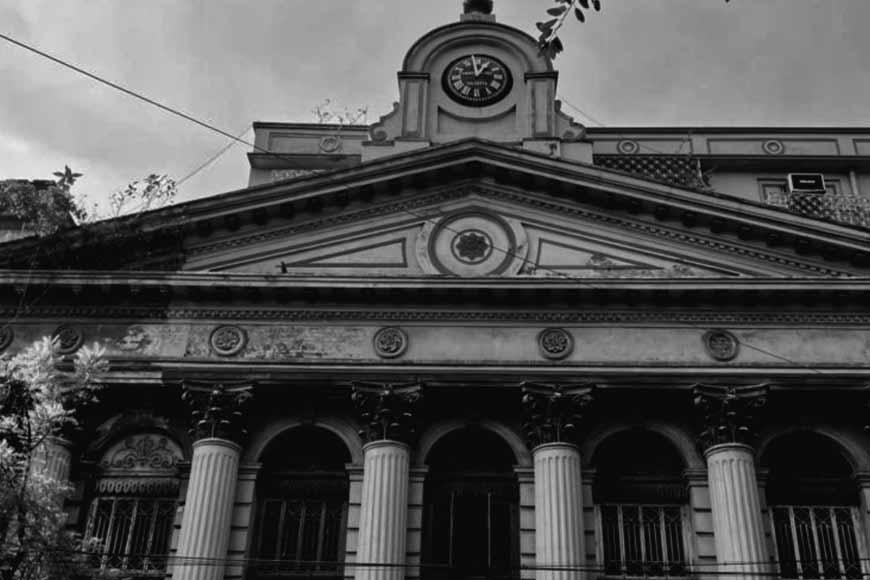Bhubonmohan Neogi: The man who fed theatre, and starved himself - GetBengal story

National Theatre
Some people chase their dreams. Bhubonmohan Neogi lived his. In a time when theatre was just beginning to find its voice in Bengal, Neogi gave it everything he had – not just money or time, but his entire life. But his passion led him to a tragic end, as life didn’t give back what he gave to theatre.
Born into a wealthy and respected family in Baghbazar, he was admired for his generosity and warmth. From gifting fine satin to his servants to helping strangers without hesitation, he was a man of rare kindness. But despite all he gave, the same stage he helped build turned its back on him. In his final days, the once-respected Bhubonmohan walked the streets of Bowbazar barefoot, surviving on scraps and memories. His love for theatre never faded, even when everything else did.
He gave his everything to the theatre, his money, his time, his home – but in the end, the theatre gave him back nothing. It took everything from him, leaving him alone and forgotten.
In the early 1860s, public theatre was becoming more and more important in Bengal. Bhubonmohan’s family-owned Rasik Neogi Ghat near Annapurna Ghat. In 1872, two theatre lovers – Amritalal Basu and Ardhendhu Shekhar Mustafi – were struggling to find a rehearsal space for their play Nil Darpan. Bhubonmohan opened his doors. He offered them a large room in his riverside house, provided a harmonium for music, and even assigned a cook to take care of the group’s needs.
When Bengal Theatre was launched in 1873, things didn’t go too well at first. But soon the play Mohon Terei Ki Kaj became a big hit. People queued all night for tickets. One evening, Bhubonmohan went with his friends Nagendranath Bandopadhyay, Amritalal Basu, and Dharmadas Basu to watch the play. They couldn’t get tickets, and when Bhubonmohan tried to enter the greenroom, he was insulted and thrown out. That moment changed his life.
He decided then and there: that he would build his own theatre, no matter the cost.
He took a lease on property at 6, Beadon Street (owned by Mohendranath Das), and set up The Great National Theatre, inspired by the Louis Theatre. The first play staged there was Kammokanon by Amritalal Basu on December 31, 1873. Bhubonmohan spent Rs. 13,000 on the stage alone, but disaster struck on opening day. A fire broke out and caused massive damage.
But Bhubonmohan didn’t give up. Within three months, he rebuilt the theatre using everything he had left.
Unfortunately, his sacrifices came at a heavy cost. He had inherited only 1% of his father’s property and had taken large loans to fund the theatre. His mother couldn’t accept his obsession with theatre and distanced herself. His trust in others was betrayed, he was blackmailed, abandoned, and left to carry the burden alone. Nagendranath Bandopadhyay extorted money and walked away with several others. Even close friends like Amritalal Basu and Girish Chandra Ghosh eventually left him.
Still, Bhubonmohan held on. In 1877, he even acted in the play Sarojini, playing Bijoy Singha himself. But acting wasn’t his strength, and the theatre slowly lost its audience.
His final days were heartbreaking. With no money, no support, and no work, he still hoped the theatre would one day call him back. But that call never came. His old friends arranged a small monthly allowance for him, but his struggles went unnoticed. When he passed away in 1927, no newspaper reported his death.
Today, Bhubonmohan Neogi is nearly forgotten. But once, he was the man who gave everything – his wealth, his comfort, his dignity, to help Bengali theatre stand tall.
Shekhar Sammadar, professor of Bengali, from Jadavpur University, says it best:
“Bhubanmohan Neogi was highly enthusiastic about theatre. Neogi lent a strong hand of support to the theatre when the art form played a pivotal role in politics. Upendranath Das’ plays Surendra Binodini and Sarat-Sarojini caused a lot of sensation among the public as they portrayed the oppression and atrocities of the British against the natives. In Sarot Sarojini, you find Saroj beating the British army who were beating the natives on the road. The plays simply throbbed with patriotic fervour and aroused anti-imperialist sentiment. During the time of colonial rule, it would take immense courage to stage plays like this. Bhubanmohan Neogi was not reluctant to produce these plays back in those times. Neogi was imprisoned along with six others after these plays were staged. For Neogi, theatre was not just sheer entertainment. It was a platform through which he could establish his political ideology as well.”










